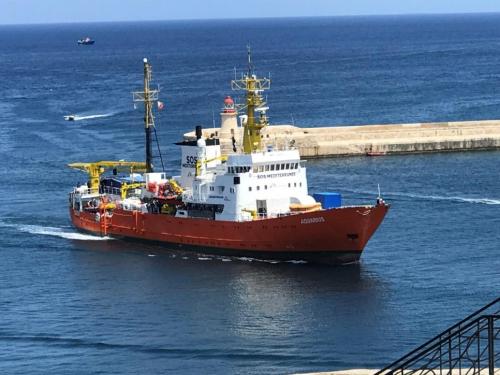UNHCR warns over Mediterranean rescue capacity
UNHCR, the UN Refugee Agency, is grateful to Malta for its decision to allow 58 rescued people from the NGO ship Aquarius to be disembarked, ending their ordeal after days at sea. We are also grateful to France, Germany, Portugal and Spain who have offered to receive these people from Malta.

The NGO vessel Aquarius arrives in the port of Valetta, Malta, in August 2018.
The leadership and solidarity of all five countries has been key to resolving this situation and should be an example to others. Humanity, compassion and unwavering commitment to saving lives and ensuring access to international protection for those in need must be kept central to the question of how Europe manages its frontiers, on sea or land.
UNHCR continues to encourage the establishment of predictable arrangements in the Mediterranean for the disembarkation of people rescued at sea. We urge States to rapidly accelerate their efforts to improve these arrangements. Doing so will save lives.
The successful resolution for those on board the Aquarius comes amid growing uncertainty over future search and rescue capacities on the Central Mediterranean.
This time last year, five NGOs were conducting search and rescue operations on the Central Mediterranean. In 2017, NGOs saved over 46, 000 lives according to the Italian Coast Guard. The de-registration of the Aquarius is deeply worrying and would represent a dramatic reduction of search and rescue capacity at precisely the moment when it needs to be stepped up.
“Reinforcing search and rescue capacity on the Central Mediterranean and disembarkation in places of safety, has to be everyone’s goal,” said UN High Commissioner for Refugees Filippo Grandi. “We are talking about people’s lives. Refugees and migrants cannot be continually put at risk while States argue over their responsibilities.”
UNHCR continues to call strongly for increasing search and rescue capacity in the Central Mediterranean and for leaving space for NGOs to contribute in a coordinated manner to these efforts. This is a collective responsibility, with saving lives as its primary concern.
Source: United Nations High Commissioner for Refugees
- 297 reads
Human Rights
Fostering a More Humane World: The 28th Eurasian Economic Summi

Conscience, Hope, and Action: Keys to Global Peace and Sustainability

Ringing FOWPAL’s Peace Bell for the World:Nobel Peace Prize Laureates’ Visions and Actions

Protecting the World’s Cultural Diversity for a Sustainable Future

Puppet Show I International Friendship Day 2020

